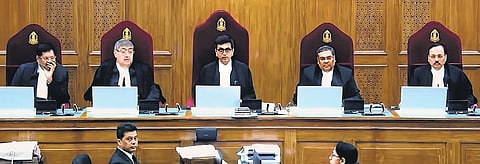

NEW DELHI: If Article 370 that gave special powers to J&K died on August 5, 2019 after the Centre read it down, it was buried on Monday when the Constitution bench of the Supreme Court upheld the government’s decision.
In a landmark verdict, a five-judge bench headed by Chief Justice of India D Y Chandrachud held that the abrogation of Article 370 was not malafide, adding the special status was a temporary and transitory provision.
It directed the Election Commission of India to hold J&K elections by September 30 next year and asked the government to restore J&K’s statehood at the earliest. The court also upheld the decision to carve out Ladakh as a Union Territory (UT) from J&K but left the question of whether a state can be turned into a UT open. “The question whether Parliament can convert a State into a Union Territory is left open,” the court said.
The court, however, found the process to abrogate Article 370 by amending the definition clauses in Article 367 to hold that “Constituent Assembly of J&K” would mean the “Legislative Assembly of J&K” and “Government of J&K” would be construed as “Governor of J&K” as illegal. In the oral arguments, the bench said that was at the heart of the matter.
The bench said the Centre should have instead employed the procedure contemplated by Article 370(3) if wanted to amend Article 370. Article 370(3) gives the President powers to issue an order declaring Article 370 inoperative but adds the proviso that that the recommendation of the J&K Constituent Assembly to do so is mandatory.
In his verdict, Justice Kaul, who will be retiring on December 25, recommended the setting up of a Truth and Reconciliation Commission to address violations of human rights perpetrated in J&K both by state and non-state actors since the 1980s. “The commission should be set up expeditiously before memory escapes. The exercise should be time-bound. There is already an entire generation of youth that has grown up with the feeling of distrust, and it is to them that we owe the greatest day of reparation,” Justice Kaul said.
However, the commission should not turn into a criminal court and “must instead follow a humanized and personalized process enabling people to share what they have been through uninhibitedly,” he said. It should be based on dialogue, allowing for different viewpoints and inputs from all sides, he added.
Talking to this newspaper, P D T Achary, Lok Sabha’s former secretary general, said that the Supreme Court had sent a radical kind of interpretation of Article 370 (3). “No doubt it is historic in one form, if one will see from a different perspective.” he said.